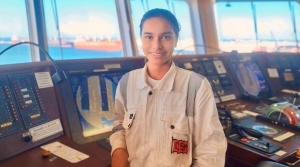


(Posted on 22/05/24)
The maritime sector is at a crossroads, grappling with an evolution that is as necessary as it is overdue - the integration and empowerment of women within its ranks.
Since Columbia Group’s establishment of its female cadet mentoring programme, it is witnessing transformative changes that signal a brighter, more inclusive future. As the industry celebrates these advances, it is clear the sector must also confront the challenges that hinder true gender equality.
Columbia Group’s Director of Sustainability, Inclusivity and Diversity, Claudia Paschkewitz said: “We’ve established a mentor programme to support women onboard which has been a huge success.
"One of our mentors, Madeleine Schuemann volunteered to support and it’s been fantastic. However, her mentee’s experiences onboard reveal a dual reality - while many male colleagues are supportive and helpful, initially eager to assist with physically demanding tasks, it is only upon asserting her capability that she receives the respect and space to perform independently. This adjustment period, though seemingly minor, underscores a larger issue of preconceived notions about women’s roles and abilities.
"However, not all interactions are so benign. Instances can still occur where women, eager to contribute and excel, face outright dissent from those unable to shed their antiquated views. Such encounters are disheartening and demonstrate that the path to equality is strewn with obstacles. It is important that as a responsible ship manager we are working with these crew members to help them change these attitudes and welcome more diverse crew members.”
Despite these challenges, the spirit of female cadets remains unbroken. Mico Clidoro, another cadet, articulates a sentiment that many women in maritime share - embracing these challenges as opportunities to prove their worth and capabilities. "As a woman in a male-dominated industry, confidence is your major pillar," said Mico Clidoro, highlighting the inner strength required to not only endure but excel in such environments.
Support systems like Columbia’s female cadetship programme are crucial. They provide not just practical advice and career guidance but also psychological support, as noted by Julia Oppermann, a Clinical Psychologist with Mental Health Support Solutions. She said: "Just speaking to someone can take a lot of weight off their minds. It's great to see just how many women are advancing in the maritime sector thanks to the support of the programme."
Ms Paschkewitz, added: “The maritime sector must continue to evolve, embracing diversity not as a quota to be met but as a value to be upheld. It is time for the industry to actively dismantle the remnants of exclusion and recognise the invaluable contributions of women. Their empowerment and integration are not just beneficial, but essential for the future of maritime. The tide is turning in the maritime industry, and it is our collective responsibility to ensure it moves in the right direction.”
Torvald Klaveness has announced the decision to consolidate all digital services under Klaveness Digital... Read more
The International Association of Dry Cargo Shipowners (INTERCARGO) has renewed its call for straightforward... Read more
The Swedish Club has delivered strong results for 2024, posting a USD 34 million profit and significantly... Read more
In line with NORDEN’s positive long-term outlook for Capesize freight rates, the company have... Read more
OrbitMI, a global provider of maritime software and data products, has expanded its workflow capabilities... Read more
Current ClassNK Senior Vice President Hayato Suga has been appointed as President & CEO as well... Read more
The surge in demand for Cape Size bulk carriers will continue for another six weeks, driven on by increased... Read more
OrbitMI, a leading provider of maritime SaaS software, has announced that Istanbul-based Statu Shipping... Read more
“The International Association of Dry Cargo Shipowners (INTERCARGO) is deeply saddened by the... Read more
As the shipping industry continues its transition to carbon-neutral fuels, ammonia and hydrogen are... Read more